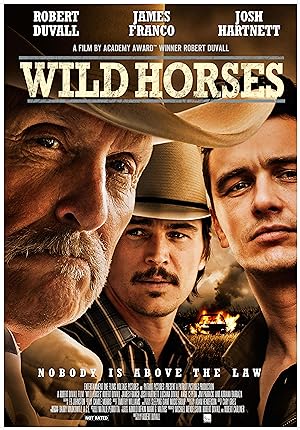Robert Duvall wrote and directed Wild Horses, which is about an aging patriarch trying to resolve all personal and business issues. Simultaneously a Texas Ranger, played by Luciana Duvall, formerly known as Pedraza, is reinvestigating a missing person’s cold case, and the missing person was a friend of the family. In a sense, they both have similar goals, but they are still on a collision course regarding how best to resolve them.
I’m glad that I saw Jayne Mansfield’s Car after Wild Horses, but before writing this review. Billy Bob Thornton wrote and directed Jayne Mansfield’s Car, which was in theaters in 2012. Robert Duvall starred in A Night in Old Mexico, which was in theaters in 2013, then directed and starred in Wild Horses, which was in theaters in 2015. My theory is that Duvall liked Thornton’s concept of three brothers dealing with the stubborn, prejudiced and emotionally distant father figure, played by Duvall naturally, but liked the dash of violence without gravity and a couple of actors (Angie Cepeda and True Blood’s Jim Parrack) from A Night in Old Mexico, thought that all the action should rotate around his character instead of a common theme uniting an ensemble cast and asked his wife if she wanted to be in the film; thus Wild Horses was born.
I have zero proof to support my theory other than the fact that I watched all three films in a little over a month. All three films address toxic masculinity, but Thornton and Duvall’s films grapple with the patriarch’s failings instead of glorifying it as A Night in Old Mexico did. Thornton has a better cast of brothers whereas Wild Horses’ cast of supporting actors are clearly excited to be there, but their characters are not as well developed as the brothers in Jayne Mansfield’s Car. James Franco gets to play a gay man, and I felt like I could see the gears of excitement that he gets to knock that off his bucket list as opposed to fully inhabiting the role. The smirk did not work this time. Josh Hartnett does a solid job, but his most memorable moment is a confrontation with the Texas Ranger, which actually seemed uncharacteristic considering his earlier annoyance with his father’s antics. These inconsistencies are not Hartnett’s fault. I almost did not know that there was an older third brother because the majority of his appearances are probably on the cutting room floor. I think that he only appeared in two to three scenes.
There is a great movie within Wild Horses, but it is not the one that appeared in theaters. The atmosphere and naturalistic style of the narrative could work with stronger characters. If it could scale back its ambitions of being a grand family epic like Giant, took out the inexplicable border confrontations and followed its Fargo impulse by focusing primarily on the Texas Ranger, Wild Horses would be a classic. Samantha Payne is a potent character, who only seems fragile. She is so understated, thin, calm and quiet in contrast to being surrounded by all these scene chewers that when she acts, it is a shock and pleasure. Her speeches are memorable, particularly about deciding to confront her father’s violence and reconciling her ambiguous feelings about him. This origin story made her more credible as a perfect foil to unflappably confront Duvall’s character and the town’s corruption. She has inherited her father’s capacity for great love and figured out how to control her explosive action without surrendering to emotion, which she then shows in car chases, when tending her wounds and when busting in on a meeting. Her emotional complexity is welcome after the two-dimensional characters that surround Duvall.
Duvall is definitely capable of sharing center stage in Wild Horses, but only with the women. Adriana Barraza, who plays the missing person’s mother, pulls a Viola Davis in Fences and steals the denouement from Duvall. I’m not sure if the women characters are written better or the female actors feel less intimidated by sharing the scene with a legend, but both Pedraza/Duvall and Barraza not only hold their own, but steal the spot light either by scaling back or exponentially over-sizing their performances respectively.
Wild Horses is an ambitious film that fails to gather all the family drama narrative threads into a cohesive story and is weak in terms of character development, but does succeed with respect to the crime story that confronts a paterfamilias whose influences negatively extends beyond his family and property.
Stay In The Know
Join my mailing list to get updates about recent reviews, upcoming speaking engagements, and film news.





